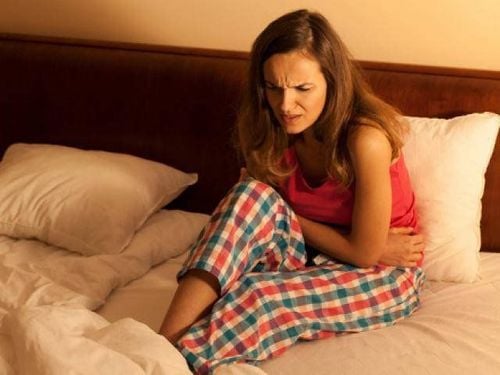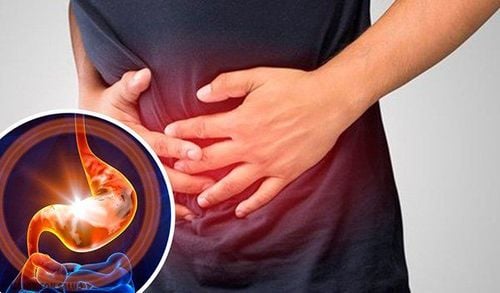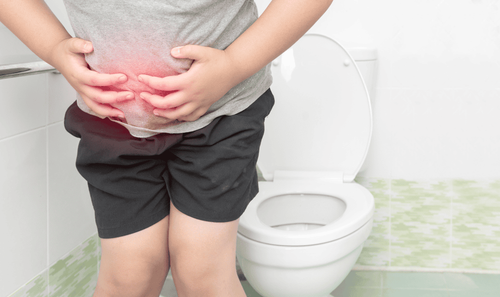Abdominal pain at night is a common condition that can impact daily activities and sleep. The following article will explore some of the causes of this condition and provide prevention tips for a healthier life.
1. Characteristics of abdominal pain
There are two types of abdominal pain that people commonly experience, including:
- Cramping abdominal pain
This pain occurs in sharp, recurring cycles. It typically appears suddenly, intensifies to a peak, then gradually subsides. There is a period of relief between each cycle. The frequency, duration, and intensity of the pain vary significantly between episodes. The primary cause is usually intestinal distension or tension.
- Constant abdominal pain
It is characterized by continuous pain, which may vary in intensity but lacks periods of relief. Patients often experience a dull ache, burning sensation, gnawing, hunger-like discomfort, or sharp pain.

2. Some causes of abdominal pain at night
2.1. Due to unhealthy eating habits.
This can be considered a common cause of nocturnal gastric pain in patients. The types of foods considered to be "culprits" of this condition include:
- Spoiled or moldy food: These foods provide a favorable environment for the growth of fungi and bacteria. When ingested, they can cause food poisoning, leading to severe abdominal pain. Other symptoms may include diarrhea, nausea, and vomiting.
- Hard-to-digest foods: Fried foods, which are high in oil, fat, and spicy ingredients, can make digestion more difficult, especially in the evening. These foods linger in the stomach for a long time, causing the stomach to secrete more acid than usual to aid digestion. As a result, patients may experience bloating and dull abdominal pain.
- Overeating at dinner: In the evening, when people are typically resting and less active, consuming a large meal can cause food to remain in the stomach, leading to discomfort and pain. Additionally, fermentation of the food can increase stomach acid levels, potentially resulting in the formation of ulcers.
2.2. Abdominal pain at night due to underlying gastric disorders.
Nocturnal gastric pain due to underlying gastric disorders includes:
- Gastric Ulcer: Gastric ulcers cause a burning sensation in the stomach area. The pain may become more intense after eating or when the stomach is empty, particularly after meals that are high in fat or processed foods. Nighttime is typically the longest period between meals, which can make the pain more persistent during this time.
- Gastroesophageal Reflux Disease (GERD): GERD is often triggered by overeating, lying down immediately after eating, or consuming hard-to-digest foods.This disorder occurs when excessive stomach acid causes food to reflux into the esophagus, leading to symptoms such as bloating, acid regurgitation, a burning sensation behind the sternum, and gnawing stomach pain. Prolonged reflux can lead to inflammation and ulceration of the esophagus.
- Irritable Bowel Syndrome (IBS): Patients with IBS often experience bloating and abdominal distension after meals. Eating a large meal in the evening can exacerbate these symptoms, contributing to gastric discomfort.
- Crohn’s Disease: In addition to gastric ulcers and the conditions above, Crohn's disease can also be a cause of nocturnal gastric pain. Crohn’s disease is an inflammatory condition of the digestive tract lining, leading to abdominal pain, weight loss, and fatigue.
2.3. Due to an unbalanced study and work schedule.
Staying up late causes the organs in the body to work harder, and the stomach is no exception. This is a time when the body should be resting after a long, tiring day. Over time, the stomach becomes overloaded due to excessive activity, leading to nocturnal gastric pain.
Additionally, when we are under stress and anxiety, the stomach secretes more acid. If this excess acid is not neutralized, it can gradually erode the mucosal lining, causing gastric ulcers and resulting in pain during the night.

2.4. Abdominal pain at night due to other underlying conditions.
Some underlying conditions that may cause abdominal pain include:
- Gallstones: This is a common cause of nocturnal gastric pain. Gallstones can block the bile duct, leading to intense, continuous pain in the stomach area. The pain tends to worsen after a heavy, fatty meal and often occurs when the person is asleep. It may be accompanied by nausea, vomiting, fever, jaundice, and pale-colored stools.
- Kidney stones: When a kidney stone begins to move and enters the ureter, patients may experience sudden, sharp pain in the lower back. The pain quickly radiates to the stomach and abdominal area. The intensity of the pain depends on the path the stone takes through the urinary tract.
- Cardiac conditions: Although rare, individuals with myocardial ischemia may experience stomach pain as a symptom.
- Appendicitis: The pain from appendicitis typically begins around the navel and gradually moves to the lower right abdomen. The pain intensifies with movement. Immediate medical attention is required to prevent a ruptured appendix, which could lead to peritonitis and pose a life-threatening risk.
3. When should you see a doctor?
Most cases of abdominal pain at night do not require immediate medical attention. To address this condition, treatment typically focuses on managing the underlying cause, along with lifestyle and dietary changes.
The pain usually lasts for a short period. However, if it persists for several hours or occurs multiple times a week, affecting daily activities, especially healthy sleep, it is advisable to consult a doctor for examination and treatment planning.
In addition, if nocturnal gastric pain is accompanied by any of the following symptoms, you should seek immediate medical attention:
- Severe unexplained pain that does not improve even after taking medication.
- Fever
- Abdominal bloating, tenderness upon palpation
- Jaundice (yellowing of the eyes or skin)
- Nausea, vomiting, especially if vomiting includes blood
- Blood in stool
- Pain during pregnancy

4. Prevention of abdominal pain at night.
To prevent nocturnal gastric pain, patients should:
- Maintain a relaxed state of mind and minimize unnecessary stress.
- Some methods to reduce the risk of nocturnal gastric pain include changing dietary habits, such as: avoiding overeating close to bedtime; sleeping with the head elevated; avoiding foods high in fat, coffee, and alcohol at night; and not consuming too much food or eating a heavy meal at dinner.
- Abdominal pain at night is not only a sign of gastrointestinal disorders but also a warning symptom of other potentially serious conditions. Therefore, if the pain occurs frequently, patients should seek medical attention at healthcare facilities for timely examination and treatment to prevent dangerous complications.
References: healthline.com, medicalnewstoday.com, medicinenet.comPlease dial HOTLINE for more information or register for an appointment HERE. Download MyVinmec app to make appointments faster and to manage your bookings easily.
To arrange an appointment, please call HOTLINE or make your reservation directly HERE. You may also download the MyVinmec app to schedule appointments faster and manage your reservations more conveniently.








